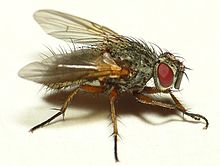Ocytata is a genus of flies in the family Tachinidae.[5][6]
| Ocytata | |
|---|---|

| |
| Ocytata pallipes | |
| Scientific classification | |
| Domain: | Eukaryota |
| Kingdom: | Animalia |
| Phylum: | Arthropoda |
| Class: | Insecta |
| Order: | Diptera |
| Family: | Tachinidae |
| Subfamily: | Exoristinae |
| Tribe: | Goniini |
| Genus: | Ocytata Gistel, 1848[1] |
| Type species | |
| Roeselia arvensis Robineau-Desvoidy, 1830[2]
| |
| Synonyms | |
Species
edit- Ocytata pallipes (Fallén, 1820)[7]
Distribution
editTajikistan, British Isles, Czech Republic, Hungary, Lithuania, Moldova, Poland, Romania, Slovakia, Ukraine, Denmark, Norway, Sweden, Andorra, Bulgaria, Croatia, Greece, Italy, Malta, Portugal, Serbia, Spain, Turkey, Austria, Belgium, France, Germany, Netherlands, Switzerland, Israel, Russia, Armenia, Azerbaijan.
References
edit- ^ Gistel, J.N.F.X. (1848). Naturgeschichte des Thierreichs fur hohere Schulen. Stuttgart: R. Hoffmann. pp. xvi + 216 + [4] pp. Retrieved 7 July 2021.
- ^ a b Robineau-Desvoidy, J.B. (1830). "Essai sur les myodaires". Mémoires présentés par divers savans à l'Académie Royale des Sciences de l'Institut de France (Sciences Mathématiques et Physiques). 2 (2): 1–813. Retrieved 7 January 2022.
- ^ Townsend, C.H.T. (1911). "Review of work by Pantel and Portchinski on reproductive and early stage characters of muscoid flies". Proceedings of the Entomological Society of Washington. 13: 151–170. Retrieved 5 September 2023.
- ^ Rondani, C. (1861). Dipterologiae Italicae prodromus. Vol. IV. Species Italicae. Pars tertia. Muscidae Tachininarum complementum. Vol. IV. A. Stocche, Parmae. pp. 174 pp.
- ^ O’Hara, James E.; Henderson, Shannon J.; Wood, D. Monty (5 March 2020). "Preliminary Checklist of the Tachinidae (Diptera) of the World" (PDF). Tachinidae Resources. Retrieved 21 August 2023.
- ^ Chandler, Peter J. (1998). Checklists of Insects of the British Isles (New Series) Part 1: Diptera. Handbooks for the Identification of British Insects. Vol. 12. London: Royal Entomological Society of London. pp. 1–234. ISBN 0-901546-82-8.
- ^ Fallen, C.F. (1820). Monographia Muscidum Sveciae. Lundae [=Lund]: Berlingianis. pp. 49–56–57–64–65–72–73–80–81–94.